Course Offerings
Andean and Amazonian Interdisciplinary Studies Minor
We are pleased to offer the Andean and Amazonian Interdisciplinary Studies Minor to undergraduates at OSU through the Department of Spanish and Portuguese. The minor requires a minimum of 15 credit hours and highlights the geographical region, its languages and peoples, its history and societies, as well as its cultures and environment. It can be completed either through study abroad with the Pachaysana Institute in Ecuador or on Ohio State's campus.
Required course: Spanish 2232 (Introduction to Andean & Amazonian Cultures)
Intermediate language proficiency in Portuguese (1103 or 5502); Quechua (5503); or Spanish (1103.01) is also required
For a full description of the minor, visit https://sppo.osu.edu/undergraduate/minor-program#andeanamazonianstudies. The full list of courses are available on this SPPO site and many of the core courses are archived below by semester.
The below video also provides information on the Minor and its required, along with informaiton on OSU's instruction on Quechua.
Justin's presentation is also available as a downloadable pdf below:
Course Information and Fliers
Spanish/Music 2208.22/7780.22: Andean Music Ensemble
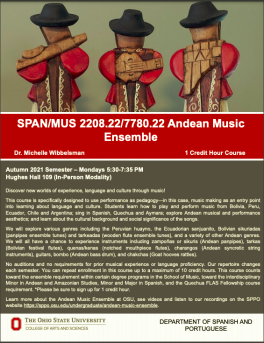
Professor Michelle Wibbelsman
Mondays 5:30-7:35pm; Hughes Hall 169
core course for the Andean and Amazonian Interdisciplinary Studies Minor
Discover new worlds of experience, language and culture through music! This course is specifically designed to use performance as pedagogy—in this case, music making as an entry point into learning about language and culture. Students learn how to play and perform music from Bolivia, Peru, Ecuador, Chile and Argentina; sing in Spanish, Quechua and Aymara; explore Andean musical and performance aesthetics; and learn about the cultural background and social significance of the songs. We will explore various genres including the Peruvian huayno, the Ecuadorian sanjuanito, Bolivian sikuriadas (panpipes ensemble tunes) and tarkeadas (wooden flute ensemble tunes), and a variety of other Andean genres. We will all have a chance to experience instruments including zampoñas or sikuris (Andean panpipes), tarkas (Bolivian festival flutes), quenas/kenas (notched mouthpiece flutes), charangos (Andean syncretic string instruments), guitars, bombo (Andean bass drum), and chakchas (Goat hooves rattles). No auditions and no requirements for prior musical experience or language proficiency. Our repertoire changes each semester. You can repeat enrollment in this course up to a maximum of 10 credit hours. This course counts toward the ensemble requirement within certain degree programs in the School of Music, toward the interdisciplinary Minor in Andean and Amazonian Studies, Minor and Major in Spanish, and the Quechua FLAS Fellowship course requirement. *Please be sure to sign up for 1 credit hour. Learn more about the Andean Music Ensemble at OSU, see videos and listen to our recordings on the SPPO website.
ARTEDUC 5795: Seminar on Topical Issues in Art Education- Global Indigenous Arts Education for Settlers
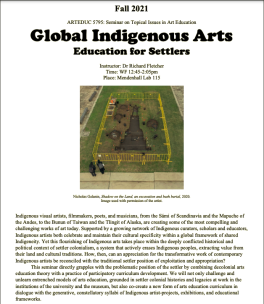
Professor Richard Fletcher
Wednesday/Friday 12:45-2:05pm; Mendenhall Lab 115
Indigenous visual artists, filmmakers, poets, and musicians, from the Sámi of Scandinavia and the Mapuche of the Andes, to the Bunun of Taiwan and the Tlingit of Alaska, are creating some of the most compelling and challenging works of art today. Supported by a growing network of Indigenous curators, scholars and educators, Indigenous artists both celebrate and maintain their cultural specificity within a global framework of shared Indigeneity. Yet this flourishing of Indigenous arts takes place within the deeply conflicted historical and political context of settler colonialism, a system that actively erases Indigenous peoples, extracting value from their land and cultural traditions. How, then, can an appreciation for the transformative work of contemporary Indigenous artists be reconciled with the traditional settler position of exploitation and appropriation? This seminar directly grapples with the problematic position of the settler by combining decolonial arts education theory with a practice of participatory curriculum development. We will not only challenge and unlearn entrenched models of arts education, grounded in settler colonial histories and legacies at work in the institutions of the university and the museum, but also co-create a new form of arts education curriculum in dialogue with the generative, constellatory syllabi of Indigenous artist-projects, exhibitions, and educational frameworks.
QUECHUA 5501.01: Beginning Quechua 1
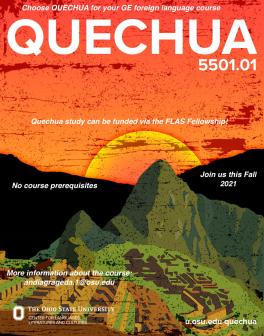
Professor Elvia Andía Grágeda
Tuesday/Wednesday/Thursday/Friday 9:00-9:55 AM; Online or In-Person in Hagerty Hall 120
Quechua, the primary language family of the ancient Incas, is spoken by approximately ten million people in the Andes and highlands of South America, primarily in Ecuador, Peru, and Bolivia. Quechua language courses are of special interest to students who want to learn about the Quechua language, culture, and society; who are pursuing the interdisciplinary minor in Andean and Amazonian Studies; or who are working in areas such as Anthropology, Linguistics, Archeology, Spanish, History, International Studies, Political Science, Geography, and many other disciplines! 5501.01 is the beginning language course for students with no previous study experience in Quechua. This course will be comprehensive, integrating culture and language from the southern Quechua family spoken in Peru.
The other courses in the Quechua Sequence (all taught by Elvia Andía Grágeda) are:
QUECHUA 5503.01: Intermediate Quechua I
QUECHUA 5504.01 Intermediate Quechua II
QUECHUA 5505.01: Advanced Quechua I
QUECHUA 5506.01: Advanced Quechua II
For more information about the Quechua program, please visit: https://sppo.osu.edu/undergraduate/quechua
For more information about this Quechua course, contact Elvia at: andiagrageda.1@osu.edu
See the below video for more information on the Quechua Learning Community at Ohio State University, and visit https://u.osu.edu/quechua/.
SPAN 7650: Musical Migrations and Latin American Identities
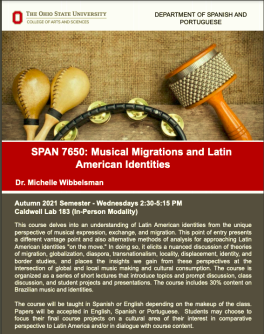
Professor Michelle Wibbelsman
Wednesdays 2:30-5:15 PMm Caldwell Lab 183
This course delves into an understanding of Latin American identities from the unique perspective of musical expression, exchange, and migration. This point of entry presents a different vantage point and also alternative methods of analysis for approaching Latin American identities "on the move." In doing so, it elicits a nuanced discussion of theories of migration, globalization, diaspora, transnationalism, locality, displacement, identity, and border studies, and places the insights we gain from these perspectives at the intersection of global and local music making and cultural consumption. The course is organized as a series of short lectures that introduce topics and prompt discussion, class discussion, and student projects and presentations. The course includes 30% content on Brazilian music and identities. The course will be taught in Spanish or English depending on the makeup of the class. Papers will be accepted in English, Spanish or Portuguese. Students may choose to focus their final course projects on a cultural area of their interest in comparative perspective to Latin America and/or in dialogue with course content.
Art Education 7701: Contemporary Theory and Art Education
with focus on theoretical approaches to Indigenous arts education
Professor Richard Fletcher
Tuesday 1:00-3:45PM; Sullivant Hall 224
Spanish 2332: Introduction to Andean and Amazonian Studies
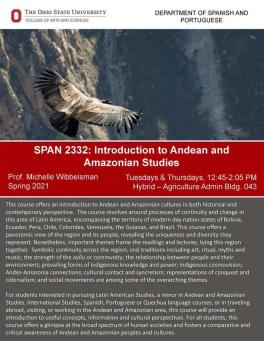
Professor Michelle Wibbelsman
Required course for the Andean and Amazonian Interdisciplinary Studies Minor
This course offers an introduction to Andean and Amazonian cultures in both historical and contemporary perspective. The course revolves around processes of continuity and change in this area of Latin America, encompassing the territory of modern day nation states of Bolivia, Ecuador, Peru, Chile, Colombia, Venezuela, the Guianas, and Brazil. This course offers a panoramic view of the region and its people, revealing the uniqueness and diversity they represent. Nonetheless, important themes frame the readings and lectures, tying this region together. Symbolic continuity across the region; oral traditions including art, ritual, myths and music; the strength of the ayllu or community; the relationship between people and their environment; prevailing forms of indigenous knowledge and power; indigenous cosmovision; Andes-Amazonia connections; cultural contact and syncretism; representations of conquest and colonialism; and social movements are among some of the overarching themes. For students interested in pursuing Latin American Studies, a minor in Andean and Amazonian Studies, International Studies, Spanish, Portuguese or Quechua language courses, or in traveling abroad, visiting, or working in the Andean and Amazonian area, this course will provide an introduction to useful concepts, information and cultural perspectives. For all students, this course offers a glimpse at the broad spectrum of human societies and fosters a comparative and critical awareness of Andean and Amazonian peoples and cultures.
History 2111: Introduction to Native American People of the Andes
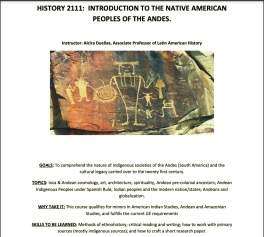
Professor Alcira Dueñas
Monday/Wednesday 11:10am-12:30pm; ONLINE (Newark Campus)
core course for the Andean and Amazonian Interdisciplinary Studies Minor
Introductory survey of the history of the Native American peoples of the Andes from the Pre-Columbian period to the present. Topics include Inca & Andean cosmology, art, architecture, spirituality, Andean pre-colonial ancestors; Andean Indigenous Peoples under Spanish Rule; Indian peoples and the modern nation/states; Andeans and globalization.
PORTUGUESE 2335 - Cannibal Brazil: Cultural Encounters and Negotiations of Identity in Literature and Culture
Explores a fundamental topic within Brazilian culture, from colonial times to present; cannibalism as cultural practice in both literal and discursive realms
core course for the Andean and Amazonian Interdisciplinary Studies Minor
SPANISH 2330 - Reinventing America
Introduction to visual and verbal representation of Latin American multi-ethnic cultures through literature and visual arts; emphasis on construction of American identities and nations
core course for the Andean and Amazonian Interdisciplinary Studies Minor
SPANISH 4515 - Andean Art, Culture, and Society
Professor Michelle Wibbelsman
Wednesday/Friday 11:10am-12:30pm; Hagerty Hall 255
Representations of cultural, social, and literary identities in the Andean regions in early and modern societies' daily life as embodied in maps, narratives, art, photography, autobiographical and literary texts
core course for the Andean and Amazonian Interdisciplinary Studies Minor
Spring 2019 course information coming soon
Autumn 2019 course info coming soon
